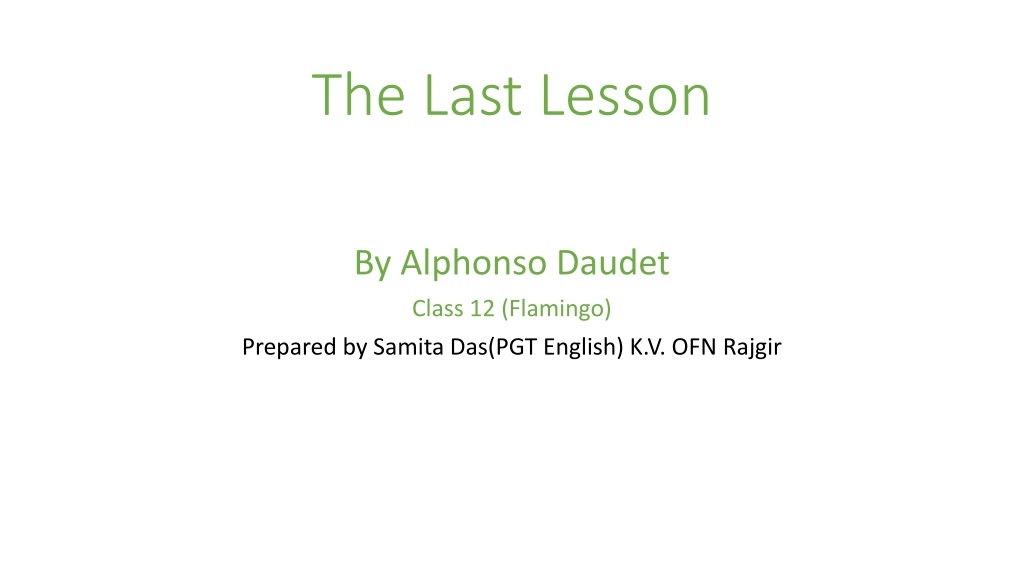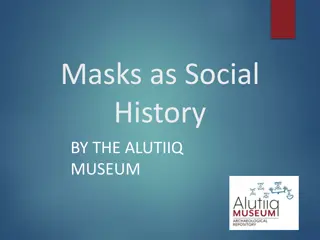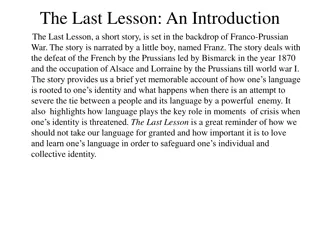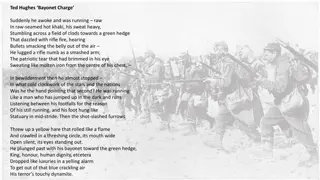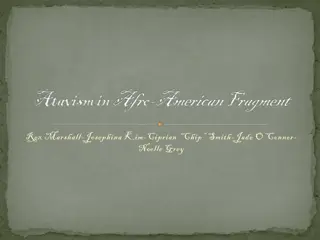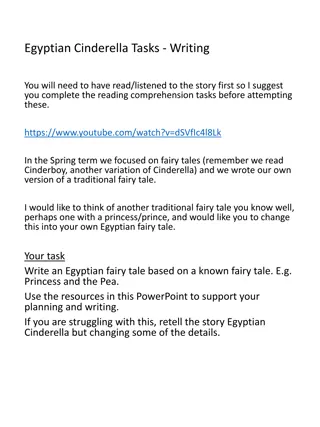The Last Lesson - Alphonse Daudet's Emotive Tale of Transition
Alphonse Daudet's poignant narrative "The Last Lesson" portrays the impact of language imposition during the Franco-Prussian War. The story unfolds in Alsace and Lorraine, annexed by Prussia, as M. Hamel announces the end of French teaching, evoking remorse and newfound appreciation from the students, especially Franz. The sudden change serves as a somber reflection on the significance of language and cultural identity amidst adversity.
Download Presentation

Please find below an Image/Link to download the presentation.
The content on the website is provided AS IS for your information and personal use only. It may not be sold, licensed, or shared on other websites without obtaining consent from the author. Download presentation by click this link. If you encounter any issues during the download, it is possible that the publisher has removed the file from their server.
E N D
Presentation Transcript
The Last Lesson By Alphonso Daudet Class 12 (Flamingo) Prepared by Samita Das(PGT English) K.V. OFN Rajgir
Introduction Alphonse Daudet (1840-1897) was a French novelist and short-story writer. The Last Lesson is an excerpt from Daudet s Contes du Lundi The story is set in the days of the Franco-Prussian War (1870-1871) Germany (Prussia) occupied two French districts of Alsace and Lorraine. Prussia consisted of the nations of Germany, Poland and parts of Austria. France was defeated by Prussia led by Bismarck. In this story the French districts of Alsace and Lorraine have passed into Prussian hands.
Late for School Franz (the narrator) was late for school that morning. He feared M.Hamel (his teacher) would scold him. M.Hamel was supposed to ask questions on participles , Franz knew nothing about the topic. He thought of running away, spending the day outdoors. The weather was warm, bright, and inviting to Franz. Franz decided otherwise and hurried off to school.
Crowd in front of the Bulletin-board Franz saw a big crowd in front of the bulletin-board. All the bad news for the last two years had come from the bulletin- board. General people were informed about lost battles and other important information through the bulletin-board. Franz wondered what could be the matter this time, but couldn t read the board. As he was hurrying towards school, Wachter, the blacksmith, called after him that he need not hurry as he would get plenty of time to reach school.
Unusual Calm at School Usually there was a lot of noise coming from the school. The noise consisted the sound of opening and closing of desks, lessons repeated in unison, the teacher s ruler rapping on the table. That day it was all very still like a Sunday morning. Franz had thought that he would get into the classroom without anyone noticing, due to the usual noise. With no noise, he was noticed by everyone, he was frightened and he blushed. But M.Hamel didn t scold him. He kindly asked him to take his seat.
The Last Lesson That day M.Hamel was in special clothes which he wore only on inspection and prize days. Surprisingly, the village elders were sitting on the back benches too. Then M.Hamel mounted his chair and spoke in a grave and gentle tone. He said that it was going to be their last French lesson. He continued that an order had come from Berlin, and only German would be taught in the schools of Alsace and Lorraine. The new master would come the next day and M.Hamel would be gone.
Sudden love for French After getting the shocking news, Franz felt sorry for not learning his French lessons. Now he developed a fascination for his language and even started liking M.Hamel. He also understood why the villagers had gathered at the back. It was their way of thanking M. Hamel for his forty years of service. Franz turn came to recite his lesson, but he couldn t. Still M.Hamel didn t scold him.
Neglect of the French language M.Hamel went on to say that it was not only little Franz fault that he had failed to learn his language. He said that the people of Alsace generally gave no importance to French. They put off learning their own native language. The parents preferred the children to work, for some more money. He even blamed himself for not putting in his best efforts. Thus, he said, the Germans could mock them if they wanted, telling that they didn t even know how to speak or write their own language.
Vive La France At last M.Hamel said that the French language was the most beautiful, clearest, and logical language in the world. He said that they should guard their language, as it was the key to their prison, since now they were enslaved. When he read a grammar lesson after that, Franz was amazed to find that he understood it very well. May be he had never listened carefully, or M.Hamel had not explained previously with so much patience, he thought. Everyone paid full attention to the class and did their work beautifully. The clock struck twelve and M.Hamel choked. He wrote Vive La France (Long Live France) on the blackboard and then dismissed the school.
Home Assignment 1. 2. 3. 4. 5. 6. What tempted Franz to stay away from school? What was unusual about M.Hamel s dress on his last day in the school? What was the order from Berlin and what changes did it cause in the school? Why was the order from Berlin called a thunderclap by Franz? What do you think made M.Hamel cry towards the end of his last lesson? Mention two things about M Hamel that surprised Franz on his last day at school. What did M.Hamel tell his students in his last French lesson? What impact did it have on them? Why? Everybody during the last lesson was filled with regret. Why do you think it was so? 7. 8.
